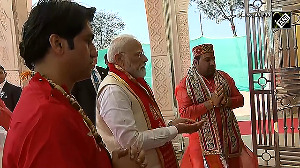 For high net worth individuals (HNIs), who hire wealth managers to take investment decisions on their behalf, the alleged Rs 400 crore (Rs 4 billion) fraud by Citibank's wealth management team employee should come as a wake-up call.
For high net worth individuals (HNIs), who hire wealth managers to take investment decisions on their behalf, the alleged Rs 400 crore (Rs 4 billion) fraud by Citibank's wealth management team employee should come as a wake-up call.
With more than $1 million (Rs 4.5 crore) of average investible assets each, HNIs are sought after by private bankers and stock brokers.
Portfolio management services (PMS) offered by brokers invest in equities, and aim to give returns four-five per cent ahead of their benchmark.
Wealth managers or private bankers invest across asset classes. In a good year, the returns can be excellent.
Re-looking at privileges
Besides higher returns, it is the exclusivity tag attached to wealth management - having a dedicated relationship manager (RM) to service needs - which makes HNIs opt for such services. But this can be a double-edged sword, with too much information passed to an individual.
Although providing customised service is the key to winning clients, the onus of doing the due diligence on their RM is with the client.
"Most clients take precautions while running an identity check on the RM when they sign up. But they forget, most frauds are committed in the later years, once the clients start trusting their managers implicitly, " says a head of a one-year-old private wealth management service.
So, a good idea is to schedule meetings (without the RM in tow) with department heads and other officials at the wealth management company. Ideally, the seniors should be aware of products and the returns promised by the RM.
"Given the amount of money an HNI invests, he/she has the right to demand a meeting with seniors at the company," says Pawan Joseph, national sales-head, wealth management, Motilal Oswal Securities.
Lessen the leeway
Most HNIs empower their wealth or portfolio management companies with a power of attorney (POA). This allows the company to go ahead and invest on behalf of their clients, instead of waiting for their approval.
The POA with a portfolio services company is limited in its mandate and used for settlement of the client's shares in his DP account.
In case of a private banker, since it covers a wider gamut of services provided, the POA also allows transfer of money from a client's bank account.
Most HNIs have more money than time to peruse their paperwork. Such complacence works in favour of fraudsters, who get emboldened when they are sure the client won't cross-check the paperwork.
"With growing proximity, clients are prone to blindly signing cheques and expecting the RM to fill up other details. Handing over a POA with a free mandate in such cases can be potent," says Vinay Agrawal, executive director, Angel Broking. which also has a wealth management department.
Agrawal's advice to HNIs: Limit the leeway wealth managers have over your money and issue cheques to companies, not intermediaries. Any person from the wealth management firm asking you to do it should be enough to raise suspicion.
Other ways to keep track of the paperwork is by paying attention to the statement of accounts. Some firms send a statement after every transaction.
Also, once a product is bought, companies issue contract notes and these should reach you within 24 hours or a maximum of two to three days.
Do not depend on an individual's word for it. Rather, check with the centralised help desk of the broker, mutual fund house, insurance company and others to confirm the purchase. HNIs should opt for the SMS alerts that companies provide for any transaction that takes place.
More cross-checking
Wealth managers are meant to dispense financial advice that suits the HNI's profile, but mis-selling of products or even selling the wrong product, irrespective of the person's risk profile, is not uncommon.
When managers propose schemes with lucrative returns, you need to ask the right questions. Ask for information about other investment options with similar returns. If it is an existing scheme, ask for research reports to check past performance.
Even then, depending on the size of the investments, clients must insist on meeting at least two senior officials before actually putting the money on the table.
Another point to be noted is that no regulatory body endorses any individual scheme. If it is still done, as in the Citibank fraud where the employee showed an alleged Securities and Exchange Board of India endorsement of an investment product to win over clients, it takes only a few minutes to check this on the official website.
Pedigree wealth managers?
Choosing the right wealth management firm also requires some study.
According to a head of a wealth management firm, "It's frightening because the latest Citibank fraud that has come to light shows that even a big name is no guarantee to protect your money against human greed. How safe an HNI's money is will depend on how vigilant the HNI is."












 © 2025
© 2025